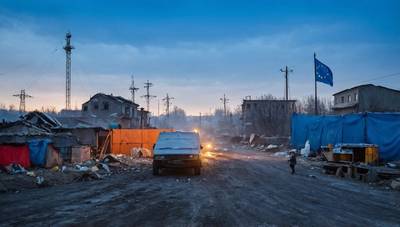In the shadow of tariffs, Europe's markets can benefit from a ceasefire in Ukraine
The markets have bet that a ceasefire agreement between Russia and Ukraine will ease the pressure on energy and euro prices, and also reduce the impact of increased U.S. tensions. Meanwhile, expectations about defence spending has already sent stocks in this sector soaring.
Marco Rubio, Secretary of State, arrived in Saudi Arabia Monday to discuss with Russian officials. President Donald Trump ordered U.S. officials last week to start talks about ending the war.
The talks are not expected to include either Ukraine or European nations. On Monday, European leaders will hold an emergency summit.
The U.S. Tariffs that have hurt the growth prospects of the euro zone remain the biggest driver for European markets. However, the hopes for a possible ceasefire following almost three years war has boosted sentiment.
The STOXX 600 index climbed to a new record high, and German stocks had their best week in two years.
The largest land war in Europe in the past two decades has resulted in hundreds of thousands or more of casualties on both sides, and an increase in energy prices and inflation. A ceasefire in hostilities would support European growth.
Aymeric Guidy, Carmignac fund manager, said that a ceasefire agreement would "decrease the energy prices, which have been a huge, big detractor to the European economy as well as European assets."
GAS - ALL YOU NEED TO KNOW
The Russian invasion of Ukraine has caused a major disruption in Europe's energy supply, pushing gas prices to over 300 euros per megawatt-hour ($314.61) by 2022. It is now about 50 euros. This is still above the levels of pre-2021.
MUFG states that the impact of a possible ceasefire on European currencies and economies will depend on whether and how quickly Russian oil supplies are restored.
The price of natural gas has fallen by more than 10% since the beginning of this month.
The largest German chemicals company BASF, which is seen as an indicator of a return to Russian gas supplies, rose over 5% Thursday, just a day after Trump announced that he spoke with Russian President Vladimir Putin. Stocks are currently at their highest level in 10 months. Corporate news has also contributed to this.
The blue-chip DAX index in Germany, where energy costs are a major obstacle to competitiveness, posted its largest daily gain in two years on that day.
After Europe's long and painful struggle to wean itself from Russian gas after the war, the expectations for the amount that will return are low.
Goldman Sachs predicts that gas prices will drop by 15% if Russian flow through Ukraine returns to the limited levels of 2023-24.
Goldman estimates that prices could drop by up to 50% if Ukrainian flows return to pre-war levels. However, Goldman adds that flows via Poland or the Nord Stream Pipelines, which would further lower prices, are "very likely" not to return.
Jane Foley is the head of FX Strategy at Rabobank. She said: "There is a real dilemma for politicians and Europeans in general to decide what path they want to follow, in terms of energy or energy security. If there were a ceasefire."
She added, "The cost of signing over your energy security to Russia again would be the signing back over of some of it."
Some were more optimistic. BofA FX analysts said that even if Europe does not increase Russian imports a decline in global energy prices would still improve the terms of trade for the EU, supporting the Euro.
The euro is still well below the $1.12 highs of last summer, despite its recent rise.
Goldman Sachs has raised its target for Europe's STOXX 600 Index, citing the underperformance of European stocks compared to peers since the Ukraine War. This suggests a roughly 5-percent increase over the next 12 months.
The bank estimates that a limited ceasefire would result in a 0.2% rise in GDP for the eurozone, or a 0.5% increase in an "upside scenario". However, it expects U.S. Tariffs to have a negative impact on output of 0.5%.
For some, the threat and impact of tariffs on markets has already been devastating, from the euro to the automakers. A ceasefire will not be able to compensate for this.
Foley, a Rabobank analyst who still expects the euro to fall to $1 by the end of the year, said: "The market is going to realise soon that the growth prospects for Europe remain very constrained."
Focus is also placed on the defence budget, which has become more urgent as European capitals are under pressure from the United States to produce plans for Ukraine security guarantees.
On Monday, an index of European aerospace- and defence-related stocks reached a record high. Saab, Rheinmetal and other defence names each saw gains of over 7%.
The yields on European government bonds, which are inversely related to prices, increased as the markets focused their attention on the amount of additional funding that may be required.
Mohit Kumar, chief Europe economist at Jefferies, said: "Any peace agreement will include security guarantees for Ukraine. This implies that Europe has no choice but increase its defense expenditure." ($1 = 0.9536 euros)
(source: Reuters)






